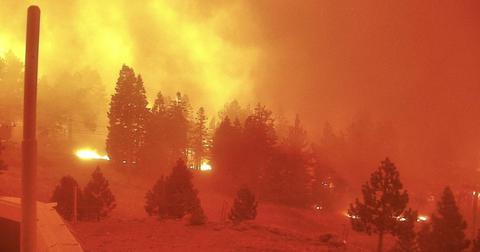Are We Normalizing Disaster Betting? The Los Angeles Wildfire Example

Table of Contents
The Rise of Disaster Prediction Markets
How Disaster Betting Works
Disaster betting markets operate similarly to other prediction markets, utilizing algorithms and data analysis to assess the likelihood of various outcomes related to a natural disaster. Participants essentially bet on the probability of specific events occurring, such as the size of a wildfire, the number of homes destroyed, or the total cost of damages. These predictions are often informed by meteorological data, historical wildfire patterns, and other relevant factors. The financial incentives drive participation, with potential profits tied to the accuracy of one's predictions.
- Different Bet Types: Bets can range from predicting the total acreage burned in a wildfire to the number of evacuation orders issued, or even the total insured losses.
- Algorithms and Data Analysis: Sophisticated algorithms process vast amounts of data to generate probabilities, influencing the odds offered and the potential payouts.
- Market Manipulation Potential: The potential for manipulation exists, with individuals or groups potentially influencing the market by spreading misinformation or strategically placing bets to affect the odds.
The accessibility of these markets is a significant concern. Many operate online, requiring minimal verification and making participation incredibly easy, even for those lacking a deep understanding of the underlying risks and complexities involved.
Ethical Concerns Surrounding Disaster Betting
Profiteering from Suffering
The core ethical concern surrounding disaster betting is the inherent act of profiting from the suffering of others. Natural disasters cause immense devastation, resulting in loss of life, displacement, and immeasurable emotional trauma. The idea of individuals making financial gains from these tragedies is deeply unsettling.
- Insensitive and Exploitative Behavior: Disaster betting can be perceived as insensitive and exploitative, trivializing the human cost of these events.
- Psychological Impact on Victims: The knowledge that others are profiting from their suffering could compound the psychological trauma experienced by victims.
- Moral Reprehensibility: Many argue that disaster betting is morally reprehensible, arguing that it's unacceptable to profit from situations that cause such widespread devastation and human suffering.
This type of betting normalizes and even glorifies the suffering inherent in natural disasters. It strips away the inherent tragedy and human element, reducing these events to mere financial opportunities.
The Los Angeles Wildfire Example: A Case Study
Specific Examples of Betting Markets Related to the LA Wildfires
While specific examples of betting markets directly tied to the recent Los Angeles wildfires may be difficult to publicly identify due to the sensitive nature of the topic and potential regulatory scrutiny, the principle remains the same. The potential for such markets to exist is high, given the widespread nature of online betting platforms.
- Volume of Betting Activity: Data on the actual volume of betting activity is often unavailable due to the lack of transparency and regulation in this grey area.
- Accuracy of Predictions: The accuracy of predictions in such markets would likely be highly variable, depending on the data used and the complexity of the wildfire's behavior.
- Regulatory Responses and Public Outcry: It's plausible that any significant public outcry or regulatory response to such markets would be reactive rather than preventative.
The Los Angeles wildfires serve as a powerful illustration of how the normalization of disaster betting could manifest itself in real-world scenarios, highlighting the need for proactive measures.
The Role of Regulation and Responsible Gambling
Current Regulations and Their Limitations
Current gambling regulations are often ill-equipped to address the unique challenges posed by disaster betting. Many jurisdictions lack specific laws prohibiting or regulating this type of market.
- Legal Grey Areas: The legal status of disaster betting is often unclear, leaving a significant regulatory gap.
- Need for Stricter Regulations: There's an urgent need for stricter regulations and oversight to prevent the growth of these morally questionable markets.
- Responsible Gambling Initiatives: Promoting responsible gambling initiatives is crucial to mitigate the risks of gambling addiction and the potential harm caused by unregulated betting activities.
Clearer guidelines and stricter regulations are crucial to curb the spread of disaster betting and protect vulnerable individuals from potential harm.
Conclusion
The normalization of disaster betting raises serious ethical concerns, particularly the idea of profiting from human suffering. The potential for exploitation and the psychological impact on disaster victims cannot be ignored. The Los Angeles wildfire example serves as a stark reminder of the potential for these markets to emerge during times of crisis. We need stronger regulations and a commitment to responsible gambling practices to prevent the further normalization of this troubling trend.
We must critically examine the implications of disaster betting and work towards a future where profiting from human suffering is not normalized. Let's actively advocate for stronger regulations and promote responsible gambling practices to prevent the further normalization of disaster betting. Join the conversation and help us challenge this disturbing trend.

Featured Posts
-
 Robert Pattinsons Night Terror Knives Horror Movies And A Sleepless Night
Apr 27, 2025
Robert Pattinsons Night Terror Knives Horror Movies And A Sleepless Night
Apr 27, 2025 -
 La Gran Sorpresa De Indian Wells Despedida Prematura De Una Favorita
Apr 27, 2025
La Gran Sorpresa De Indian Wells Despedida Prematura De Una Favorita
Apr 27, 2025 -
 Belinda Bencic Back On Top After Becoming A Mother
Apr 27, 2025
Belinda Bencic Back On Top After Becoming A Mother
Apr 27, 2025 -
 Professional Stylist Behind Ariana Grandes Dramatic Hair And Tattoo Reveal
Apr 27, 2025
Professional Stylist Behind Ariana Grandes Dramatic Hair And Tattoo Reveal
Apr 27, 2025 -
 3 Million For Camille Claudel Bronze Record Price At French Auction
Apr 27, 2025
3 Million For Camille Claudel Bronze Record Price At French Auction
Apr 27, 2025
